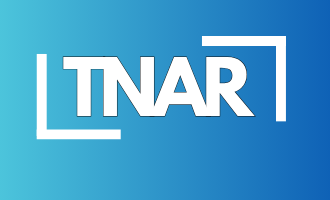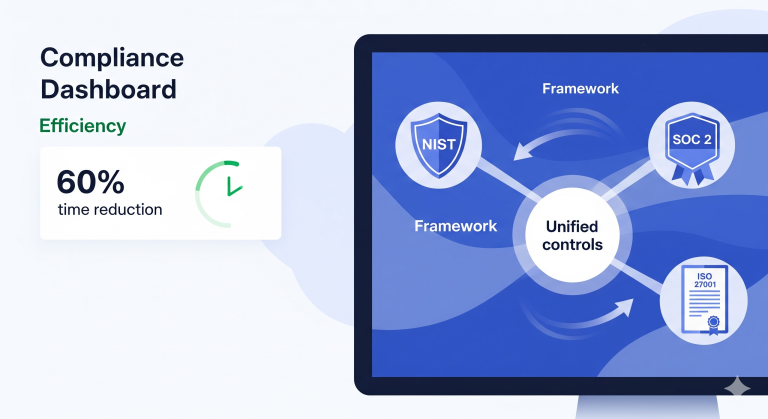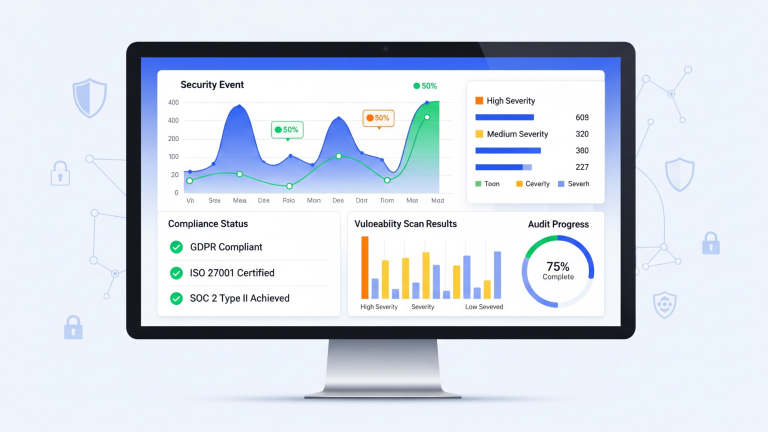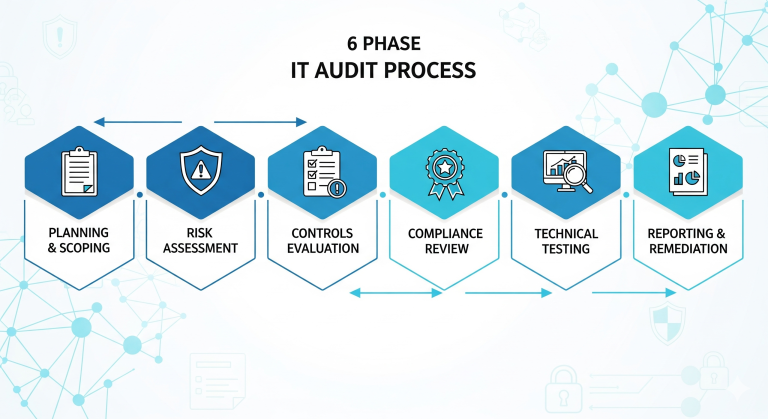The IT auditing profession faces unprecedented demand as organizations grapple with complex cybersecurity threats. According to ISACA’s 2024 State of Cybersecurity report, 73% of hiring managers report difficulty finding IT auditor candidates with complete skill sets required for today’s roles. This skills gap creates substantial opportunities for professionals who master the right competencies.
Modern IT auditors need far more than traditional technical knowledge. The role demands a sophisticated blend of technical expertise, analytical thinking, and strategic business acumen. Understanding what an IT auditor does provides the foundation, but mastering these 15+ essential IT auditor skills determines career success.
This guide reveals the exact skills employers prioritize when hiring IT auditors in 2025. You’ll discover which competencies command higher salaries, how to prioritize skill development, and practical strategies for mastering each area.
Core Technical IT Auditor Skills Every Professional Needs
Technical proficiency forms the bedrock of IT auditing excellence. Modern auditors must navigate complex technology landscapes while maintaining deep expertise in established frameworks and emerging technologies.
IT Frameworks and Standards Mastery
COBIT Framework Implementation stands as the cornerstone technical skill for IT auditors. COBIT provides comprehensive governance and management objectives for enterprise IT. Successful auditors understand how to apply COBIT’s five principles across different organizational contexts. They can map business goals to IT objectives using COBIT’s goals cascade methodology.
NIST Cybersecurity Framework expertise has become essential as organizations prioritize security governance. Auditors must understand the framework’s five core functions: Identify, Protect, Detect, Respond, and Recover. This knowledge enables effective evaluation of cybersecurity programs and risk management processes.
ISO 27001 and compliance standards knowledge ensures auditors can assess information security management systems effectively. Understanding these standards helps auditors evaluate control effectiveness and identify compliance gaps across various industry regulations.
Systems and Network Architecture Understanding
Modern IT environments require auditors to understand cloud technologies, hybrid infrastructures, and containerization. This includes knowledge of major cloud platforms like AWS, Azure, and Google Cloud. Auditors must assess security controls in multi-cloud environments and understand shared responsibility models.
Database security and management skills enable auditors to evaluate data protection controls, access management, and backup procedures. Understanding SQL, database administration concepts, and data governance frameworks supports comprehensive audit coverage.
Network security architecture knowledge helps auditors assess firewalls, intrusion detection systems, and network segmentation effectiveness. This technical foundation enables thorough evaluation of network-based security controls.
Data Analytics and Audit Technology
Computer-assisted audit techniques (CAATs) proficiency allows auditors to analyze large datasets efficiently. Tools like ACL, IDEA, and Tableau enable pattern recognition and anomaly detection across complex data environments.
Log analysis and monitoring capabilities help auditors evaluate security incident detection and response processes. Understanding SIEM tools and log management systems supports effective control testing procedures.
Analytical and Problem-Solving Skills for Modern IT Auditing
Analytical thinking separates competent auditors from exceptional ones. These skills enable auditors to identify risks, evaluate evidence, and draw logical conclusions from complex information.
Critical Thinking Applications
Evidence evaluation techniques help auditors assess the reliability and relevance of audit evidence. This includes understanding different types of evidence, their relative strengths, and appropriate sample sizes for testing procedures.
Root cause analysis skills enable auditors to move beyond symptom identification to underlying problem discovery. The “5 Whys” technique and fishbone diagrams provide structured approaches for investigating control failures.
Risk assessment methodologies allow auditors to prioritize audit efforts based on business impact and likelihood. Understanding qualitative and quantitative risk analysis supports effective audit planning and resource allocation.
Pattern Recognition and Trend Analysis
Anomaly detection capabilities help auditors identify unusual patterns that may indicate control weaknesses or fraudulent activity. Statistical analysis techniques and data visualization tools support this analytical process.
Trend analysis skills enable auditors to identify emerging risks and control deterioration over time. Comparing current results with historical data provides valuable insights for management recommendations.
Business process mapping abilities help auditors understand how IT controls fit within broader organizational processes. This systems thinking approach improves audit effectiveness and recommendation relevance.
Communication and Interpersonal Skills That Set Top IT Auditors Apart
Technical expertise means little without the ability to communicate findings effectively. Top auditors excel at translating complex technical concepts into actionable business insights.
Technical Translation and Reporting
Executive presentation skills enable auditors to communicate effectively with C-level executives and board members. This includes structuring presentations logically, using appropriate business language, and focusing on business impact rather than technical details.
Clear audit report writing transforms technical findings into understandable recommendations. Effective reports include executive summaries, clear risk statements, and practical remediation steps with timelines and resource requirements.
Visual communication abilities help auditors present complex information through charts, graphs, and process flows. Data visualization skills make audit findings more accessible to diverse audiences.
Stakeholder Engagement and Relationship Building
Active listening techniques help auditors understand auditee perspectives and concerns. This builds trust and cooperation, leading to more effective audit processes and better implementation of recommendations.
Conflict resolution skills become crucial when audit findings challenge existing practices or reveal control deficiencies. Diplomatic communication maintains professional relationships while ensuring audit objectives are met.
Cross-functional collaboration abilities enable auditors to work effectively with IT teams, business units, and external partners. Understanding different organizational perspectives improves audit quality and stakeholder buy-in.
Business Acumen: Understanding IT’s Role in Organizational Success
Modern IT auditors must understand how technology supports business objectives. This business perspective transforms technical auditors into strategic advisors.
Strategic Business Alignment
Industry knowledge helps auditors understand sector-specific risks, regulations, and business models. Healthcare auditors need HIPAA expertise, while financial services auditors must understand banking regulations and payment card standards.
Financial analysis capabilities enable auditors to evaluate IT investments, cost-benefit analyses, and budget allocation decisions. Understanding financial statements and key performance indicators supports business-focused audit recommendations.
Process optimization identification skills help auditors spot efficiency improvement opportunities. Understanding lean methodologies and business process improvement techniques adds value beyond traditional compliance testing.
Risk Management and Governance
Enterprise risk management understanding helps auditors align IT audit activities with organizational risk appetite and tolerance levels. This includes knowledge of risk frameworks like COSO and ISO 31000.
Regulatory compliance expertise ensures auditors can assess adherence to relevant laws and regulations. This includes understanding SOX requirements, data privacy regulations like GDPR, and industry-specific compliance standards.
Change management principles help auditors evaluate how organizations implement new technologies and processes. Understanding change management best practices supports more effective audit recommendations.
Cybersecurity Expertise: The Modern IT Auditor’s Competitive Edge
Cybersecurity has become central to IT auditing as organizations face increasing threats. Modern auditors need sophisticated security knowledge to assess contemporary risk landscapes.
Advanced Security Concepts
Zero trust architecture understanding enables auditors to evaluate modern security models that assume no implicit trust. This includes assessing identity verification, device security, and network microsegmentation controls.
Threat modeling capabilities help auditors understand how attackers might target organizational assets. Knowledge of attack vectors, threat intelligence, and vulnerability assessment techniques supports comprehensive security evaluations.
Incident response evaluation skills enable auditors to assess organizational preparedness for security breaches. This includes understanding detection capabilities, response procedures, and recovery processes.
Emerging Technology Security
Cloud security assessment abilities have become essential as organizations migrate to cloud platforms. Auditors must understand shared responsibility models, cloud-specific controls, and multi-cloud security challenges.
AI and machine learning security knowledge helps auditors evaluate risks associated with artificial intelligence implementations. Understanding algorithmic bias, data privacy, and model security supports emerging technology assessments.
IoT and operational technology security expertise enables auditors to assess risks in connected device environments. Understanding industrial control systems and IoT security frameworks supports comprehensive risk evaluations.
Compliance and Regulatory Knowledge
Privacy regulation compliance skills ensure auditors can assess GDPR, CCPA, and other privacy law adherence. Understanding data subject rights, consent management, and privacy by design principles supports effective privacy audits.
Industry-specific security standards knowledge helps auditors evaluate specialized compliance requirements. This includes PCI-DSS for payment processing, NERC-CIP for utilities, and FedRAMP for government contractors.
Security framework alignment abilities enable auditors to map organizational controls to multiple frameworks simultaneously. Understanding how different frameworks relate helps optimize compliance efforts and reduce audit burden.
Project Management and Organization Skills for Audit Excellence
Effective project management ensures audit deliverables meet quality standards, deadlines, and stakeholder expectations. These operational skills distinguish professional auditors from technical specialists.
Audit Planning and Execution
Risk-based audit planning skills help auditors prioritize effort based on business impact and likelihood. Understanding risk assessment methodologies and audit universe concepts supports effective resource allocation.
Quality assurance processes ensure audit work meets professional standards and organizational requirements. This includes understanding audit documentation standards, review procedures, and quality control frameworks.
Stakeholder communication planning helps auditors manage expectations and maintain engagement throughout audit processes. Regular status updates and milestone communications prevent surprises and build confidence.
Resource Management and Efficiency
Time management techniques enable auditors to balance multiple engagements while meeting deadlines. Understanding prioritization frameworks and productivity methods supports effective workload management.
Team coordination abilities help senior auditors manage junior staff and coordinate with external resources. Understanding delegation principles and team development supports scalable audit operations.
Technology tool proficiency improves audit efficiency through automated testing, data analysis, and documentation tools. Knowledge of audit management software, collaboration platforms, and analysis tools reduces manual effort.
Essential Certifications and Professional Development Pathways
Professional certifications validate expertise and demonstrate commitment to ongoing learning. Understanding certification requirements and career paths helps auditors make strategic development decisions.
Primary IT Audit Certifications
Certified Information Systems Auditor (CISA) remains the gold standard for IT audit professionals. CISA certification validates knowledge of audit processes, governance, and risk management. The certification requires five years of experience in information systems auditing, control, or security.
Certified Internal Auditor (CIA) provides broader internal audit expertise that complements IT specialization. CIA certification demonstrates understanding of internal audit fundamentals, risk management, and governance processes across all business functions.
Certified Information Security Manager (CISM) focuses on information security management and strategy. CISM certification validates knowledge of security governance, risk management, and incident response from a management perspective.
Specialized Technical Certifications
CISSP certification provides comprehensive cybersecurity knowledge across eight security domains. This certification demonstrates expertise in security architecture, asset security, and security operations.
COBIT implementation certifications validate specific framework knowledge and application abilities. ISACA offers COBIT Foundation and Implementation certifications that demonstrate practical framework expertise.
Cloud security certifications like CCSP (Certified Cloud Security Professional) validate expertise in cloud-specific security controls and architectures. These certifications become increasingly valuable as organizations adopt cloud technologies.
Professional Development Strategies
Continuing education requirements maintain certification validity and ensure knowledge stays current. Most certifications require 20-40 continuing education hours annually through conferences, training, or professional activities.
Industry association participation provides networking opportunities and access to best practices. Organizations like ISACA, IIA, and ISC2 offer local chapters, conferences, and professional resources.
Mentorship and peer learning accelerates skill development through experienced practitioner guidance. Formal mentorship programs and informal peer networks provide valuable career development support.
Developing IT Auditor Skills: Practical Action Plan for Career Success
Systematic skill development accelerates career advancement and increases professional value. Understanding how to assess current capabilities and plan development activities ensures efficient progress.
Self-Assessment and Gap Analysis
Skills inventory evaluation helps identify current strengths and development needs. Comparing current capabilities against job requirements and industry standards reveals priority areas for improvement.
Market demand analysis identifies which skills offer the greatest career advancement potential. Understanding salary premiums for different certifications and specializations supports strategic development decisions.
Career goal alignment ensures skill development activities support long-term objectives. Whether targeting technical specialization or management roles, understanding career paths guides development priorities.
Learning Resources and Development Activities
Formal education options include degree programs, graduate certificates, and professional courses. University programs provide structured learning and networking opportunities with other professionals.
Online learning platforms offer flexible, cost-effective skill development options. Platforms like Coursera, Udemy, and LinkedIn Learning provide courses on technical skills, frameworks, and professional development.
Hands-on experience opportunities provide practical application of theoretical knowledge. Volunteer auditing, internal projects, and cross-training initiatives offer valuable experience without changing roles.
Performance Measurement and Progress Tracking
Competency benchmarking provides objective measures of skill development progress. Regular self-assessments and 360-degree feedback identify improvement areas and validate development efforts.
Career advancement indicators help track progress toward professional goals. Metrics like salary increases, promotion timelines, and responsibility expansion validate skill development investments.
Professional network expansion supports career advancement through industry connections and opportunities. Active networking through professional associations and industry events builds valuable relationships.
Continuous improvement mindset ensures skills remain current as technology and business requirements evolve. Regular learning, adaptation to industry changes, and proactive skill updates maintain professional relevance.







